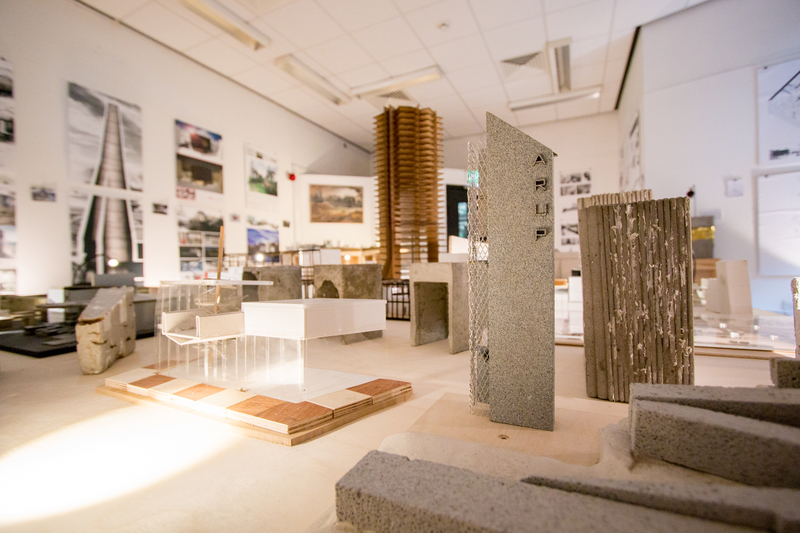Dr Samuel Austin, Degree Programme Director
School of Architecture, Planning and Landscape
Humanities and Social Sciences
What did you do?
Architecture’s distinctive studio-based pedagogy encourages working together at all stages of the Architecture programme, providing students with opportunities for active engagement with their learning, in a shared subject-specific working space/environment. The professional accreditation requirements of the programme further strengthen this pedagogy, as all modules are core and compulsory, fostering a sense of shared learning and togetherness among students as they progress across stages.
A number of initiatives were introduced last year that have contributed to a greater sense of community.
How did you do it?
Listening and acting upon student feedback
In response to the 2017/18 NSS results, the subject of Architecture established a working group with stage 3 students to develop a greater understanding about students’ learning and teaching concerns on the course, including assessment and feedback. The main focus of the working group was to co-produce a new approach to feedback, which led to the re-design of assessment and feedback forms for design modules, to be piloted this year. This led to a reduced emphasis on project notes, clearer action points, and the replacement of sliders marking students’ performance against learning outcomes with star charts, better capturing the students overall learning experience, strengths and weaknesses, in a visual format.
Contact time with tutors
Large cohorts on design modules in each stage are broken into smaller tutor groups, facilitating close connections among students and among students and tutors, with frequent (weekly) communications leading to personalised learning and feedback. The quantity and quality of contact time also allows tutors to support students in various aspects of their learning experience, and to listen to and act on student feedback (see previous point).
Good quality staff support
A number of initiatives have been introduced to support students and to foster the development of, and sense of belonging to, an Architecture learning community. These include:
- Events and exhibitions: the visual nature of the work allows Architecture to hold events and exhibitions for students to showcase their work to their peers, and to a wider audience beyond the university, including alumni. These events are considered opportunities to celebrate student work and the work produced within the school. They also provide opportunities to congratulate students and for students to congratulate each other, in their shared endeavour. Alumni are invited to take part in the events, with their talks focussing on showing how their learning at university and any project or dissertation ideas that they had during their studies, informed or supported their current practice as an Architect. Events and exhibitions take place throughout the year and more of these events were introduced in the past academic year, with an event focused on celebrating stage 3 dissertations (component) submissions scheduled around NSS time.

- Use of space within the Architecture building: traditionally studio spaces were allocated per stage, with students in the same stage sharing studio spaces. To facilitate shared learning and give students more agency, in the past academic year students chose where to work, and by choosing and using specific spaces, students were in turn giving those spaces features that identify with different working practices/preferences. This approach not only facilitated shared and peered learning, but also helped reduce tensions between students who have different working practices. Additional spaces within the Architecture building that facilitate community building include: the mini-library called “MagsSpace” created with the support of academic staff, to provide students and staff with an informal and relaxed space to read, discuss or talk about Architecture; and the “Kofi Bar”, a small café run by students.
- Improved support in non-design modules: different types of seminars and drop-in sessions were introduced in support of non-design modules.
- Supporting shared responsibility for informal learning: a range of student-led initiatives were introduced and strengthened in the past academic year, with the support of Architecture academic staff and of the Architecture society (NUAS). Year 2 and year 6 students worked together to create a social and cultural/skills development programme of events called “Signal”, that would appeal to both, undergraduate students and postgraduate students, and to students with different interests. The events were wide-ranging, including guest lectures, debates, mental health initiatives, external engagements and volunteering opportunities, as well as events of a more social nature. These initiatives led to the development of a student pamphlet/newsletter “Fold”, which published five issues in the past academic year. Overall, the events were well-attended with cross-year participation and contribution, potentially indicating that the re-shuffling of studio spaces had facilitated greater interactions across stages and a shared sense of identity.
Contact details
Dr Samuel Austin, School of Architecture, Planning and Landscape
